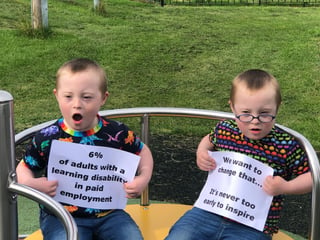Prejudice against Down’s Syndrome is a form of eugenics – Brian Wilson


Those of us with a family interest in Down’s Syndrome tend to notice positive stories about people with the condition.
The past few days have provided a good crop. There’s the girl in Boston who loves baking and, when nobody would give her a job, opened her own little bakery with help from her mother and sister.
Advertisement
Hide AdAdvertisement
Hide AdThe Boston Golden Goose Market placed a regular order. Publicity led to more business and they are now employing people with and without disabilities.
Then there’s Arras in northern France where a young woman is about to become the country’s first local councillor with Down’s Syndrome. The mayor said: “She will be a councillor like no other but she will be a councillor in her own right.”
Or how about the enterprising parents of little Odhran McLafferty in Easter Ross who have signed him up with a model agency. Odhran will also feature in a campaign called Nothing Down aiming to change pereceptions of Down’s Syndrome.
Equal rights campaign
These stories point to an important truth. The term Down’s Syndrome covers a wide abilities range and as many personalities as there are individuals. Just like the rest of us.
Our own son, now aged 27, is not a baker, a prospective councillor or a model. He’s just a nice, gentle guy who enhances the lives of those he comes in contact with and costs the state very little.
So why is society so determined to get rid of all these people; to eliminate them en bloc? Why in some supposedly advanced, liberal European countries are they now on the point of succeeding?
These questions are brought into focus by the campaign supported by the actress Sally Phillips, herself a Down’s parent, to amend the 1967 Abortion Act in order to equalise the treatment of all unborn children with non-fatal disabilities.
By far the biggest category of terminations beyond 24 weeks involve cases in which testing has taken place for Down’s Syndrome. That is the product of a relentless campaign to persuade parents that the birth of a Down’s child is a disaster which should, at all costs, be avoided.
‘Most astounding hypocrisy’
Advertisement
Hide AdAdvertisement
Hide AdFor as long as our son has been alive, we have squirmed to read glowing reports of more “accurate” tests which identify Down’s pregnancies for one purpose only. Nobody can question the campaign’s success – in the UK, more than 90 per cent of Down’s births are pre-empted (along, inadvertently, with many non-Down’s births).
Another Down’s parent, happy with his lot, is the journalist Dominic Lawson. He made a valid point this week about justified outrage over a brief appearance in Downing Street of a bonkers special adviser with a record of eugenicist ravings.
Dominic wrote: “Hidden in plain sight is the most astounding hypocrisy. Eugenics is practiced in this country, funded by the taxpayer... I am referring to the law governing the termination of pregnancy and the fact it actively discriminates against those unborn children who are likely to have subnormal IQs or physical disabilities.”
If there is enough truth in that observation to give pause for thought in the UK, then consider what is happening in Scandinavia. Denmark and Iceland have official policies of eliminating Down’s kids. At the last count, they are 98 and 100 per cent successful, respectively.
But why stop at Down’s Syndrome? Are there not other troublesome conditions which might cost the state money and cause upset to perfect families? Once this form of eugenics is accepted and packaged as an undisputed advance for medical science, it is difficult to draw a line.
There is of course an alternative. It is to offer balanced information rather than eugenic prejudice to prospective parents. It is to create a climate of support and quality provision to help families adjust. It is to welcome diversity as an asset rather than a curse.
And if you disagree with any of that, just remember the baker, the councillor, the child model... Lumping a category of people together in order to get rid of them all is not a healthy trait in any society.
